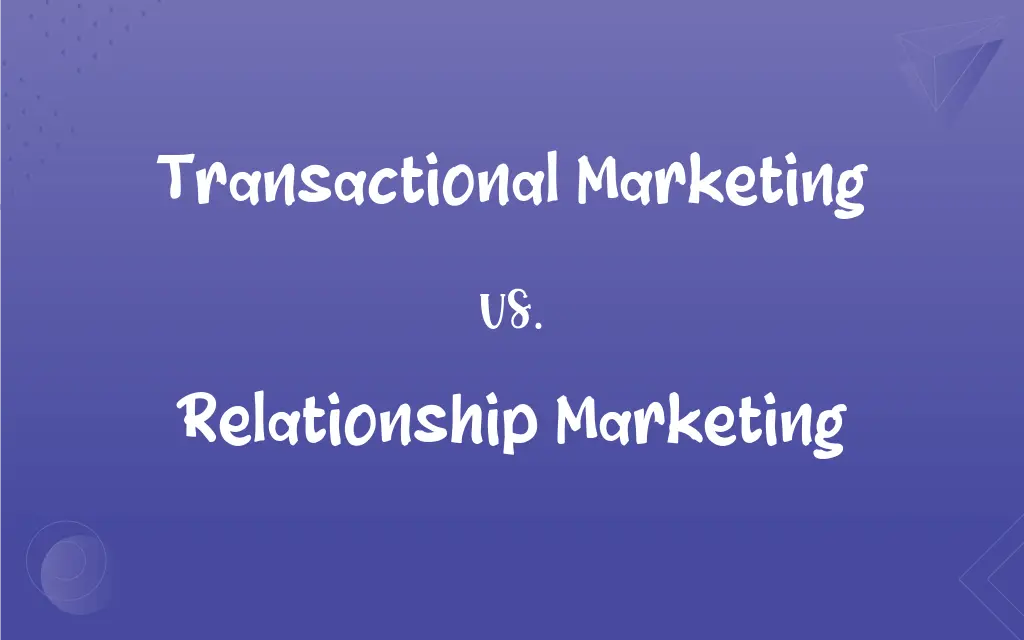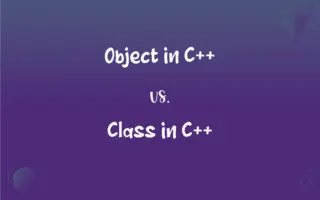Transactional Marketing vs. Relationship Marketing: What's the Difference?
Edited by Aimie Carlson || By Janet White || Published on February 15, 2024
Transactional marketing focuses on one-time sales and immediate profits, whereas relationship marketing emphasizes long-term customer connections and loyalty.

Key Differences
Transactional marketing concentrates on single transactions, aiming to maximize sales and profits from each customer interaction. Relationship marketing, in contrast, focuses on building long-term relationships with customers, prioritizing customer satisfaction and loyalty over immediate gains.
In transactional marketing, customer engagement is minimal and primarily transaction-based. Relationship marketing, however, invests in deeper, ongoing interactions with customers to foster loyalty and repeat business.
Transactional marketing often uses direct, sales-driven communication, emphasizing product features and prices. Relationship marketing employs personalized, value-driven communication, nurturing a deeper understanding of customer needs and preferences.
The success of transactional marketing is measured by sales volume and short-term profits. Relationship marketing evaluates success through customer retention rates, lifetime value, and customer satisfaction metrics.
Transactional marketing strategies are typically aggressive and sales-oriented, aiming for quick conversions. Relationship marketing strategies are more nurturing, aiming to build trust and a sense of partnership with customers.
ADVERTISEMENT
Comparison Chart
Focus
Immediate sales and profits
Long-term customer relationships
Engagement
Minimal, transaction-based
Deep, ongoing interaction
Communication
Direct, sales-driven
Personalized, value-driven
Success Metrics
Sales volume, short-term profits
Customer retention, lifetime value
Strategic Approach
Aggressive, quick conversions
Nurturing, trust-building
ADVERTISEMENT
Transactional Marketing and Relationship Marketing Definitions
Transactional Marketing
Involves minimal customer engagement beyond the purchase point.
Their transactional marketing strategy didn't include follow-up communication after purchase.
Relationship Marketing
Aims to build customer loyalty and engagement over time.
The brand's relationship marketing strategy included personalized email campaigns.
Transactional Marketing
Relies on direct, product-focused communication.
Transactional marketing was evident in their ads that highlighted product features and discounts.
Relationship Marketing
Involves understanding and responding to individual customer needs.
Their relationship marketing approach led to customized services for loyal customers.
Transactional Marketing
A marketing strategy focused on quick sales and immediate customer conversion.
The store's transactional marketing approach resulted in high one-time sales during the holiday season.
Relationship Marketing
Measures success through customer satisfaction and retention.
Relationship marketing success was reflected in their high customer retention rates.
Transactional Marketing
Emphasizes maximizing profits from each customer interaction.
Their transactional marketing tactics included aggressive pricing and promotions for instant purchases.
Relationship Marketing
Utilizes personalized, value-driven communication.
The company's relationship marketing was evident in their customer-centric social media content.
Transactional Marketing
Transactional marketing prioritizes short-term sales goals over customer relationships.
The flash sale was a classic example of transactional marketing, aiming for rapid sales.
Relationship Marketing
Focuses on creating and maintaining long-term relationships with customers.
Their loyalty program, a part of relationship marketing, encouraged repeat purchases.
FAQs
What's the key goal of relationship marketing?
To create loyal, long-term customers.
How does transactional marketing view customer interactions?
As opportunities for quick sales and immediate profit.
What defines relationship marketing?
Building and maintaining long-term customer relationships.
Can transactional marketing build customer loyalty?
It's less effective at building loyalty than relationship marketing.
What metrics are used in transactional marketing?
Sales volume and immediate profit are key metrics.
What are relationship marketing success indicators?
Customer retention, satisfaction, and lifetime value.
How does relationship marketing benefit a company?
By fostering a loyal customer base and positive word-of-mouth.
What is transactional marketing?
A strategy focused on immediate sales and customer conversion.
Is customer feedback vital in transactional marketing?
It's less emphasized compared to relationship marketing.
How important is personalization in relationship marketing?
Highly important; it's central to building customer connections.
Does relationship marketing require more investment?
Yes, it requires more time and resources to build relationships.
How does relationship marketing handle customer complaints?
As opportunities to strengthen the relationship through resolution.
Is transactional marketing short-term oriented?
Yes, it focuses on immediate results.
Are price discounts common in transactional marketing?
Yes, they're often used to encourage immediate purchases.
Is transactional marketing suitable for luxury brands?
Less so, as luxury brands often focus on building brand prestige and customer loyalty.
Can relationship marketing lead to higher customer lifetime value?
Yes, by increasing repeat business and referrals.
How does technology impact transactional marketing?
It enables efficient, large-scale customer reach for quick sales.
What role does customer service play in relationship marketing?
It's crucial for maintaining and enhancing customer relationships.
Do promotions play a role in transactional marketing?
Yes, promotions are a key tactic for immediate sales.
Is relationship marketing effective for all businesses?
It's particularly effective where long-term customer value is high.
About Author
Written by
Janet WhiteJanet White has been an esteemed writer and blogger for Difference Wiki. Holding a Master's degree in Science and Medical Journalism from the prestigious Boston University, she has consistently demonstrated her expertise and passion for her field. When she's not immersed in her work, Janet relishes her time exercising, delving into a good book, and cherishing moments with friends and family.
Edited by
Aimie CarlsonAimie Carlson, holding a master's degree in English literature, is a fervent English language enthusiast. She lends her writing talents to Difference Wiki, a prominent website that specializes in comparisons, offering readers insightful analyses that both captivate and inform.







































































